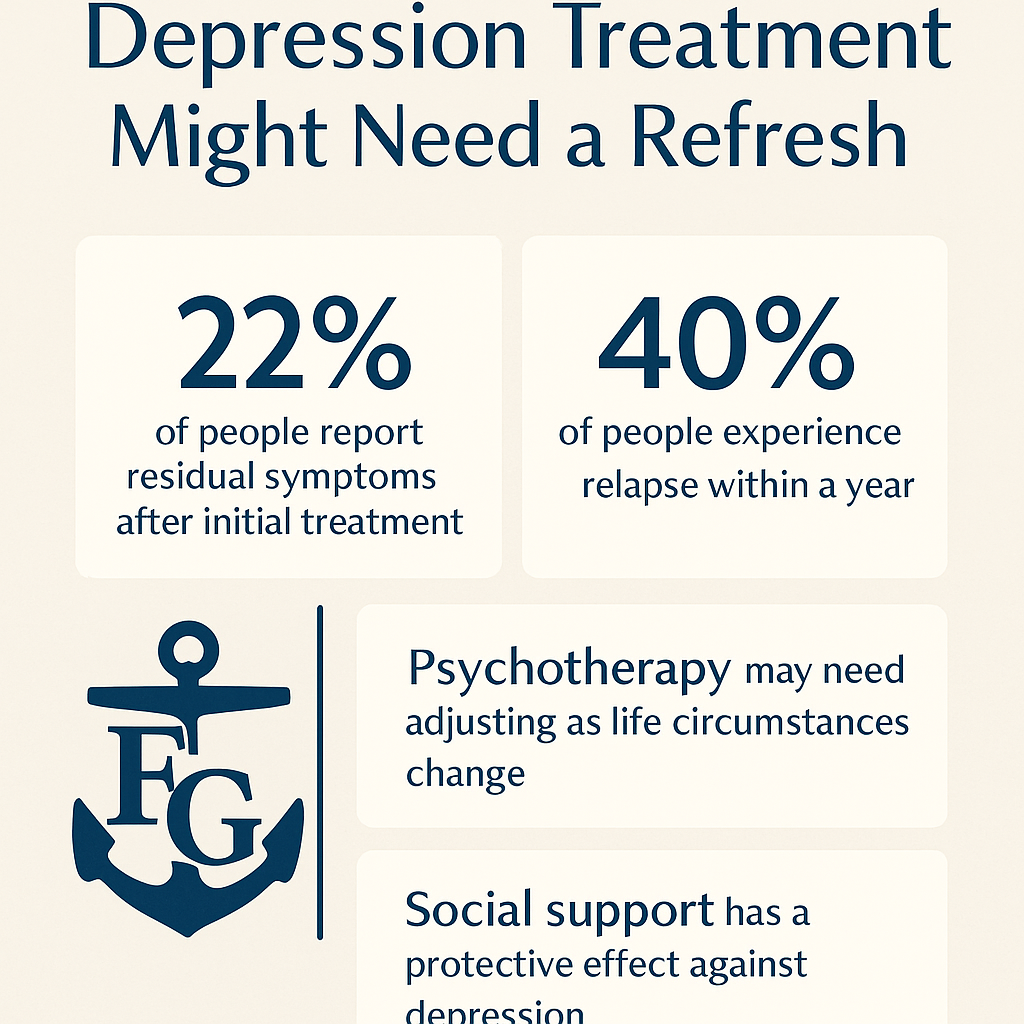I used to think feeling “better” meant I’d never have to look back. That once I got out of that dark place, I’d be free for good. But life is more complicated than that. Sometimes the feelings creep back in—not all at once, but little by little. And it’s not failure. It’s not losing everything you worked for. It’s just a sign that your depression treatment may need to change as you change.
If you’ve been wondering why things feel heavier lately, or questioning whether you’re just “stuck like this,” you’re not alone. Let’s talk about what it really means when your mental health feels flat after treatment—and how refreshing your approach could help you feel more like yourself again.
You’re Surviving More Than You’re Living
It doesn’t always happen in a dramatic way. Sometimes, it’s subtle. You go from feeling okay to just…numbing your way through the day. You wake up already counting the hours until you can go back to bed. You find yourself avoiding people, responsibilities, or even your own reflection.
When every day starts feeling like survival, it’s a quiet alarm bell. Depression treatment isn’t supposed to make life “fine enough”—it’s meant to help you rebuild a sense of connection, purpose, and ease. If you feel like you’re just getting by again, it’s a clear sign to revisit your care.
The Coping Skills That Once Helped Feel…Empty
Remember when certain tools actually helped? Maybe you had a few therapy tricks that gave you some relief, or activities that grounded you in the moment. But now, you run through the motions—deep breaths, journaling, mindfulness—and nothing really shifts.
That doesn’t mean you’re broken. It means your brain has adapted, and your care needs to adapt too. It’s normal to outgrow certain strategies. Over time, you might need more depth in therapy, a new approach to medication, or different kinds of support like group therapy or wellness practices.
Life Has Changed, But Your Treatment Hasn’t
Growth can be sneaky. Maybe you have a new job, different life stressors, or relationships that have shifted. What worked for you a year ago might not fit the reality of your life now. Depression symptoms can evolve, and your treatment should evolve too.
Refreshing your depression treatment could mean trying therapy approaches like cognitive behavioral therapy (CBT), acceptance and commitment therapy (ACT), or even trauma-informed modalities. It might mean exploring medication adjustments or adding supportive therapies like yoga or mindfulness. If you’re near Cape Cod, MA, Foundations Group Behavioral Health offers flexible depression treatment programs that grow with you—not against you.
You’re Drifting From People Who Matter
It’s easy to pull away from people without realizing it. You cancel plans, respond to texts late (or not at all), and slowly your world shrinks. Isolation doesn’t always look like loneliness—it often looks like withdrawal that you rationalize as “needing rest” or “having too much on your plate.”
But connection is one of the most protective factors against depression. If you notice yourself drifting from friends, family, or even the people you met during treatment, it’s time to check in with your mental health. Often, when your social battery drains too quickly, or you feel overwhelmed by interactions, it’s a sign that your depression treatment isn’t meeting your emotional needs anymore.
Your Body Feels Tired, Heavy, or Out of Sync
Depression isn’t just in your mind—it’s deeply physical. Changes in sleep patterns, eating habits, unexplained aches, and chronic fatigue are all red flags that your mental health may need attention.
Sometimes, we brush these off as “life stress,” but they can be key indicators that your treatment needs a tune-up. Many people benefit from integrating physical wellness practices into their care plan—like movement, nutrition counseling, or even medication that addresses both mental and physical symptoms.

You’ve Started Wondering, “Why Bother?”
It’s a quiet thought that can carry a heavy weight: “Is this as good as it gets?” If you find yourself daydreaming about escape—whether that’s isolating, shutting down, or giving up on routines—it’s time to listen to yourself.
That thought doesn’t mean you’re doomed. It means your current treatment isn’t addressing your deeper needs for meaning, connection, or fulfillment. Depression treatment isn’t supposed to make you tolerate life—it’s supposed to help you reclaim it.
Re-Evaluating Your Depression Treatment Is A Strength, Not a Setback
Here’s the truth many people won’t say out loud: outgrowing your treatment plan is normal. Needing more support after progress is normal. Just like relationships, careers, and goals evolve—so does your mental health care.
Refreshing your depression treatment is like renovating a house you love. The foundation stays, but you upgrade the parts that no longer serve you. You’re not starting from scratch. You’re building something stronger, more aligned with who you’ve become.
Signs It’s Time to Refresh Your Depression Treatment
- You’re experiencing more low-energy, disconnected days than before
- You feel emotionally flat or “numb”
- Old symptoms or thought patterns are resurfacing
- Coping strategies feel like a checklist, not actual relief
- You’ve had significant life changes without adjusting care
- Loved ones have noticed mood or behavior shifts
- You feel stuck but unsure what else to try
FAQ: Refreshing Depression Treatment After Initial Recovery
How do I know if it’s really depression coming back or just life stress?
If your low moods, withdrawal, or exhaustion last more than two weeks, disrupt your ability to function, or start affecting relationships and physical health, it’s likely more than just “stress.” A mental health professional can help you sort through the symptoms.
Does changing my treatment mean I failed?
Not at all. In fact, recognizing when you need a change shows awareness and strength. Mental health is dynamic. Refreshing treatment is a proactive way to support yourself, not a sign of regression.
How often should I review my depression treatment plan?
Ideally, you should review your treatment plan with your provider every 3–6 months or anytime you feel like symptoms are returning or worsening. It’s normal to adjust care seasonally or during big life transitions.
What are some options for refreshing my treatment plan?
You can explore different therapy styles (CBT, ACT, DBT), re-evaluate medications, join supportive groups, or engage in structured programs like an intensive outpatient program (IOP). Many people also benefit from integrating holistic wellness practices like mindfulness or movement.
Is it okay to ask for more support even if I’ve already done treatment?
Yes, absolutely. Ongoing support is part of long-term well-being, not a reflection of failure. Whether it’s re-engaging in therapy, tweaking your medication, or joining a local program like Foundations Group Behavioral Health in Cape Cod, you’re allowed to reach out as many times as you need.
You Deserve to Feel Like Yourself Again
Needing a refresh isn’t starting over—it’s proof that you’re still showing up for yourself. If your depression treatment no longer feels like it’s serving you, you deserve to explore better options. You don’t have to settle for “getting by.” You can reconnect with hope, with ease, and with yourself.
📞 Ready to feel more like yourself again? Call 888-685-9730 or visit here to learn more about depression treatment in Cape Cod. You don’t have to figure it out alone.








